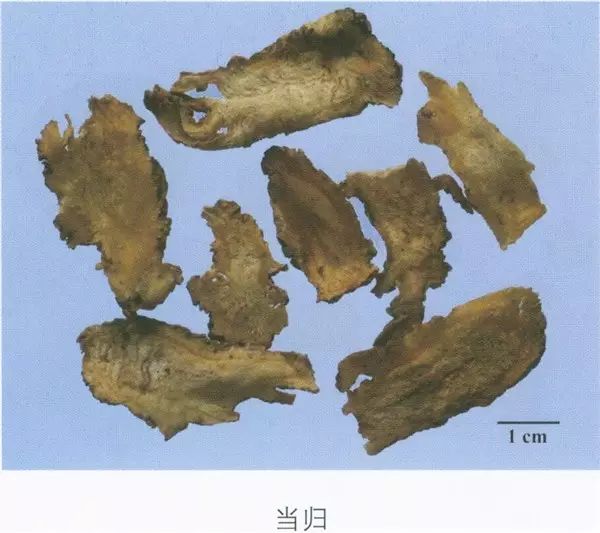First, let me share the previous article on San Qi (Notoginseng): Understanding San Qi. I hope more students will participate in the discussion. If you have any questions or memory techniques, feel free to reply in the original text at the bottom left! If you find it useful, you can also share it with other students. Students on WeChat who want to see past articles can click on the head icon in the upper right corner of the WeChat dialogue box to view historical messages! Below is today’s content: Angelica Sinensis (当归, Angelica sinensis (Oliv.) Diels)
Source
This product is the dried root of the plant Angelica sinensis (Oliv.) Diels from the Umbelliferae family.
Origin
Mainly produced in Gansu Province, including Yangxian, Wudu, Zhangxian, Chengxian, and Wenxian; also found in Hubei, Yunnan, and Sichuan provinces. Primarily cultivated.
Image
Source textbook
Harvesting and Processing
Angelica sinensis is generally harvested in the autumn of the second year, removing stems, leaves, and soil. It is placed aside to allow moisture to evaporate slightly until the roots become soft, then bundled and dried slowly over smoke.
Identification
The product is slightly cylindrical, with 3-5 or more lateral roots, measuring 15-25 cm in length. The surface is light brown to brownish-yellow, with longitudinal wrinkles and transverse lenticels. The root head (归头, gui tou) has a diameter of 1.5-4 cm, with ring patterns, a rounded blunt upper end, or several prominent root scars, with remnants of purple or yellow-green stems and leaf sheaths; the main root (归身, gui shen) has an uneven surface; the lateral roots (归尾, gui wei) have a diameter of 0.3-1 cm, tapering, often twisted, with few root hairs. The texture is flexible, with a yellowish-white or light brown cross-section, thick bark, fissures, and numerous brown secretory cavities, while the wood part is lighter in color, with a yellow-brown ring in the cambium. It has a strong aroma, with a sweet, spicy, and slightly bitter taste.
Roots that are excessively dry, lacking oil, or with a greenish-brown cross-section are not suitable for medicinal use.
Processed Angelica Sinensis
It appears as round, oval, or irregular thin slices. The outer skin is light brown to brownish-yellow. The cut surface is yellowish-white or light brownish-yellow, flat, with fissures, thick bark, scattered brown oil spots, and light brown cambium rings, with the wood part being lighter. The texture is flexible and oily. It has a strong aroma, with a sweet, spicy, and slightly bitter taste.
Wine-processed Angelica Sinensis
It resembles Angelica slices. The cut surface is deep yellow or light brownish-yellow, with slight scorch marks. It has a strong aroma, with a hint of wine fragrance.
Properties and Channels
Sweet, spicy, and warm. It enters the liver, heart, and spleen channels.
Characteristics
This product is sweet, warm, and nourishing, with a spicy nature that promotes circulation. It primarily enters the liver and heart channels, and also the spleen channel. It is effective in nourishing blood, invigorating blood circulation, regulating menstruation, alleviating pain, moistening the intestines, and relieving constipation. It can dispel cold, making it suitable for conditions of blood deficiency and blood stasis with cold symptoms, especially beneficial for those with dry intestines and constipation. It is a key herb for gynecological regulation and a great tonic for internal medicine, commonly used in external and trauma medicine for reducing swelling and healing injuries.
Functions
Nourishes blood, invigorates blood circulation, regulates menstruation, and moistens the intestines to relieve constipation.
Memory Aid for Angelica Sinensis
vv289
Angelica: Remember the story of “the husband returns but does not come back, causing the wife to remarry.”
Memory association: Is a man who comes home after work like a turtle? To others, it may seem so, but I believe that a married man who comes home after work is like returning home, taking care of children, doing housework, cooking, and caring for his wife: often helping children with homework (nourishing blood), maintaining family harmony (harmonizing blood), giving massages to relieve fatigue and asking about their well-being (warming channels and alleviating pain), and cooking delicious meals (moistening intestines and relieving constipation).
Use Angelica root for nourishing blood, Angelica tail for breaking blood, and whole Angelica for invigorating blood.
When the turtle is complete (whole), it is alive; when it has nourished the body and broken the tail, it is dead. (Invigorating blood uses whole, nourishing blood uses body, breaking blood uses tail).
Indications
(1) Blood deficiency with pale complexion, dizziness, and palpitations.
(2) Irregular menstruation, amenorrhea, dysmenorrhea.
(3) Abdominal pain due to deficiency-cold, pain due to blood stasis, trauma, and numbness.
(4) Painful sores and ulcers.
(5) Blood deficiency with dry intestines and constipation.
Compatibility
Angelica Sinensis combined with Huang Qi (黄芪, Astragalus membranaceus): Angelica Sinensis is warm and nourishes blood, while Huang Qi is slightly warm and tonifies Qi. When Qi is abundant, blood is generated. The combination of these two herbs strongly benefits Qi and blood, treating blood deficiency or simultaneous Qi and blood deficiency.
Dosage and Administration
For internal use: decoction, 6-12 g; or in pills or powders. Angelica root nourishes blood, Angelica tail breaks blood, and whole Angelica harmonizes blood. Generally, it is best used raw; for invigorating blood and promoting menstruation, it is advisable to stir-fry with wine.
Precautions
This product is sweet, warm, and nourishing, so it is contraindicated in cases of excessive dampness, fullness, or diarrhea.
Pharmacology
This product has anti-anemia effects, enhances immune function, inhibits platelet aggregation, has anti-thrombotic effects, protects against myocardial ischemia and hypoxia, dilates peripheral blood vessels, lowers blood pressure, stimulates or inhibits uterine smooth muscle, relaxes bronchial smooth muscle, lowers blood lipids, has anti-inflammatory effects, and protects the liver.
Story of Angelica Sinensis
In a great mountain, although there are many precious medicinal materials, few dare to enter the mountain to collect herbs due to the presence of many poisonous snakes and fierce beasts.
Outside the mountain, there is a village where young people were chatting. One young man said, “I have the greatest courage.”
Others doubted him and challenged, “If you are so brave, would you dare to enter the mountain to collect herbs?”
“Of course! When I collect the herbs, I will cure your ‘cowardice’!”
“Alright, if you get bitten by a poisonous snake or beast, we will have to find you a ‘revival medicine’!”
The young man was very indignant and vowed to enter the mountain to collect herbs. However, when he returned home and told his mother, she strongly opposed it:
“You are my only son. If anything happens to you, our family will be left without a successor!”
The son replied, “I have sworn that if I do not go, I will not be able to hold my head high in the village.”
His mother thought for a moment and said, “If you must go, then marry the girl you are engaged to first. If anything happens to you, at least we will have a family.”
Thus, the son temporarily did not enter the mountain and first married the girl he was engaged to. After marriage, the couple had a good relationship. The young man could not bear to abandon his newlywed wife, so he never mentioned going into the mountain.
Months passed. One day, the young men in the village gathered again and criticized the young man:
“Now you are convinced, right, boastful king!”
“Who is boasting?” The young man changed his expression.
“You!”
“Nonsense!”
“Alright, we can all see clearly that you only love your wife.”
Young men care about their reputation; who would tolerate such words? The young man went home and told his wife:
“Help me prepare; I will go into the mountain to collect herbs tomorrow.”
“I won’t let you go…” His wife threw herself into his arms, crying.
“I must show my manly side; I cannot let others ridicule me for being untrustworthy and only loving my wife.”
“But what will happen to me if you leave?”
“Let me tell my mother; you wait for me for three years. If I do not return in three years, you can remarry!”
On the second day, the young man bid farewell to his mother and wife and went into the mountain. The mother-in-law and daughter-in-law lived together at home. A year passed, and the young man did not return; two years passed, and still no news. The wife waited and waited, crying every day. Due to worry and sadness, she developed a serious women’s illness from blood deficiency and Qi deficiency. As the third year approached, the mother-in-law could not bear to see her daughter-in-law suffer and said:
“You have waited for him for three years; it seems he will not return. Do not delay your own life; go and marry someone else.”
At first, the daughter-in-law refused, but after repeated persuasion from her mother-in-law and thinking her husband might be dead, she returned to her family and married someone else.
However, just a few days later, the young man who had gone to collect herbs suddenly returned. The whole village was in an uproar. When everyone saw that he had brought back many herbs, they praised him for his courage and ability. When the young man entered the house and did not see his wife, he hurriedly asked where she had gone. His mother said:
“You made a promise! She waited for you for three whole years, and you did not send a word. Now, she has married someone else.”
The son was filled with regret, hating himself for not returning sooner. He could not forget his wife and asked someone in the village to send a message to meet her again.
When the wife heard that her original husband was still alive, she cried bitterly. People advised her: “The rice is already cooked; it is useless to regret. You should at least meet him; this is also a matter of loyalty.”
Later, they met. The wife was in tears, and she told the young man:
“These three years have been so painful waiting for you! I looked forward to your return every day, but for three years you did not come back, nor did you send a single letter. Now I have married someone else, and my heart is filled with resentment and regret!”
The young man sighed deeply and said: “Do not be sad; this is not your fault. I went into the mountain and dug up many precious medicinal materials, some of which are rare. I originally wanted to dig more, return, and make you some clothes. Alas, now who should I give them to? You take these herbs and sell them! I hope you have a happy life in the future.”
After saying this, the young man turned and left.
The wife, who was already ill, could not bear such a blow and collapsed to the ground. After a while, she saw the herbs left by the young man and thought, “If living is meaningless, I might as well eat some herbs and die from poisoning!” So she grabbed a few unknown herb roots and ate them. To her surprise, she not only did not get poisoned, but after a while, her complexion gradually improved, and her women’s illness was cured.
Someone asked her: “How did your illness get better?” She showed the herbs the young man had brought back and said: “It was these that cured me.”
People remembered this herb that specifically treats women’s diseases. Later, some even cultivated this herb and named it “Angelica Sinensis” to remember the story of “the husband returns but does not come back, causing the wife to remarry.”


